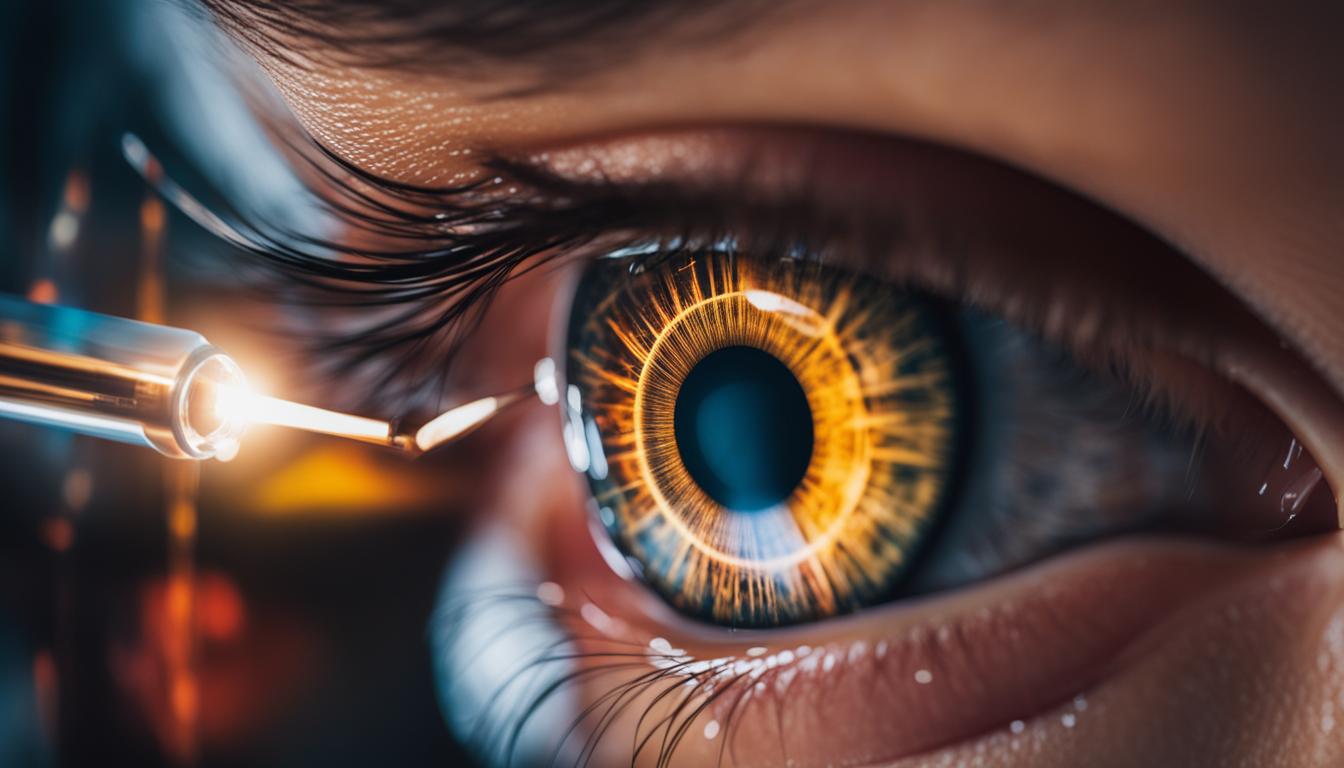Taking care of your eyes is crucial for maintaining good vision and overall well-being. By following these eye care tips, you can protect your eyes and enjoy the numerous benefits of good eye health.
Regular comprehensive eye exams, maintaining blood sugar levels, knowing your family’s eye health history, and maintaining a healthy weight are essential steps to ensure healthy eyes. Additionally, wearing protective eyewear, quitting smoking, and giving your eyes rest when using digital devices can further protect your vision.
Key Takeaways:
- Regular comprehensive eye exams are crucial for early detection of vision problems and eye diseases.
- Managing blood sugar levels is important to prevent eye complications related to diabetes.
- Knowing your family’s eye health history helps identify potential hereditary eye diseases.
- Maintaining a healthy weight reduces the risk of obesity-related eye conditions.
- Wearing protective eyewear is essential to prevent eye injuries in sports and the workplace.
Comprehensive Eye Exams for Early Detection
Regular comprehensive eye exams are essential for early detection and treatment of common vision problems and eye diseases. These exams go beyond simply checking your visual acuity; they allow eye care professionals to thoroughly examine your eyes for any signs of damage or disease that may not be immediately apparent. One of the key components of a comprehensive eye exam is the dilated eye exam, where eye drops are used to widen your pupils, giving the eye care professional a clear view of the back of your eyes.
A comprehensive eye exam can help detect common vision problems such as nearsightedness or farsightedness, which may require corrective lenses. More importantly, it can also uncover eye diseases like glaucoma, diabetic eye disease, and age-related macular degeneration, which often have no warning signs in their early stages. Detecting these conditions early allows for timely treatment and management, significantly reducing the risk of permanent vision loss.
So, don’t wait until you notice symptoms or your vision deteriorates. Schedule regular comprehensive eye exams to ensure your eyes are in good health and catch any potential issues before they progress. Your eyes are precious, and taking proactive steps to protect them through comprehensive eye exams is a vital part of maintaining optimal eye health.

Quick Tips:
- Make it a habit to schedule a comprehensive eye exam at least once every two years, or as recommended by your eye care professional.
- Be sure to inform your eye care professional about any family history of eye diseases, as this may increase your risk.
- If you have diabetes or other chronic health conditions, it is especially important to have regular comprehensive eye exams to monitor for any related eye complications.
Managing Blood Sugar Levels for Eye Health
One of the key factors in maintaining good eye health is managing blood sugar levels, especially for individuals with diabetes. High blood sugar levels can significantly increase the risk of developing various eye diseases and complications. By effectively managing blood sugar levels, individuals can minimize the potential damage to their eyes and preserve their vision.

Diabetes, a chronic condition characterized by high blood sugar levels, can lead to several eye diseases, including diabetic retinopathy, cataracts, and glaucoma. Diabetic retinopathy, in particular, is a common diabetic eye disease that affects the blood vessels in the retina. It can cause vision loss and, if left untreated, can even lead to blindness.
The ABCs of diabetes management, which stands for A1c, blood pressure, and cholesterol, play a crucial role in maintaining stable blood sugar levels. A1c is a blood test that measures average blood sugar levels over the past three months. It is recommended to keep the A1c level below 7% for many individuals with diabetes. Monitoring and managing blood pressure, with a target goal of below 140/90 mmHg, is also important in reducing the risk of eye complications.
Diet and exercise
A balanced diet and regular exercise are essential components of managing blood sugar levels. Eating a variety of nutrient-rich foods, including whole grains, lean proteins, fruits, and vegetables, can help regulate blood sugar levels and promote overall health. Engaging in regular physical activity, such as brisk walking or cycling, can also improve insulin sensitivity and help control blood sugar levels.
- Avoid sugary foods and beverages.
- Include complex carbohydrates and high-fiber foods.
- Choose lean proteins and healthy fats.
- Stay hydrated with water.
Working closely with a healthcare team, including a primary care physician and an eye care professional, is crucial in managing diabetes and maintaining good eye health. The healthcare team can provide guidance on medication, lifestyle modifications, and regular eye screenings to detect and treat any potential eye complications early.
Knowing Your Family’s Eye Health History
Understanding your family’s eye health history is essential for assessing your risk factors for developing hereditary eye diseases and conditions. Many eye diseases, such as glaucoma, cataracts, and macular degeneration, have genetic components. By knowing your family’s eye health history, you can work with your eye care professional to monitor and manage any potential risks or early signs of eye diseases.
Having knowledge of your family’s eye health history allows your eye care professional to have a better understanding of your individual risk factors. They can provide personalized recommendations and screenings based on your family’s history. For example, if your family has a history of glaucoma, your eye care professional may recommend regular eye pressure checks or more frequent comprehensive eye exams to detect early signs of the disease.
It’s important to communicate with your family members about any known eye conditions or diseases. This information can help guide your eye care professional in assessing your risk factors, developing prevention strategies, and providing appropriate treatments if necessary. Early detection and intervention are crucial in managing hereditary eye diseases, and knowing your family’s eye health history plays a vital role in this process.
Risk Factors Associated with Family Eye Health History:
- Age-related macular degeneration (AMD)
- Glaucoma
- Cataracts
- Retinal diseases
- Myopia (nearsightedness) or hyperopia (farsightedness)
It is important to note that having a family history of certain eye conditions does not guarantee that you will develop them. However, it does increase your risk, and early detection through regular eye exams is essential for maintaining optimal eye health.

By being proactive and aware of your family’s eye health history, you can take the necessary steps to protect your vision and prevent or manage hereditary eye diseases. Remember to discuss your family’s eye health with your eye care professional during your next comprehensive eye exam to ensure that you receive the appropriate screenings and care for your eye health.
Maintaining a Healthy Weight for Eye Health
Maintaining a healthy weight is not only important for overall well-being but also plays a significant role in preserving your eye health. Obesity and overweight are known risk factors for various health conditions, including diabetes, which can lead to vision loss and eye complications. By managing your weight through a balanced diet and regular exercise, you can reduce the risk of obesity-related eye conditions.
Obesity is closely linked to diabetes, a condition that can cause long-term damage to the blood vessels in the retina, leading to a condition known as diabetic retinopathy. This condition is one of the leading causes of blindness in adults. By maintaining a healthy weight, you can help prevent the onset or progression of diabetes, reducing the risk of vision loss.
Additionally, carrying excess weight can put strain on the body, including the eyes. This strain can contribute to conditions such as glaucoma, which damages the optic nerve, and macular degeneration, a leading cause of vision loss in older adults. By adopting a healthy lifestyle and maintaining a healthy weight, you can protect your eyes from these conditions and promote good eye health.
The Importance of Regular Eye Exams
In addition to maintaining a healthy weight, it is crucial to prioritize regular eye exams as part of your overall eye health routine. Regular eye exams can help detect and manage any potential issues early on, allowing for timely treatment and prevention of further complications. Your eye care professional can assess your eye health and provide guidance on maintaining healthy vision.
Regular comprehensive eye exams can detect eye diseases and conditions that have no obvious symptoms, such as glaucoma and macular degeneration. By catching these conditions early, you can take steps to preserve your vision and prevent further damage.
Remember, maintaining a healthy weight is just one aspect of maintaining good eye health. By adopting a holistic approach to eye care, which includes regular eye exams, protecting your eyes from potential injuries, and practicing healthy habits such as giving your eyes rest from digital screens, you can ensure optimal eye health and enjoy the benefits of clear vision for years to come.

Importance of Protective Eyewear
When it comes to safeguarding your eyes, protective eyewear is a must-have accessory. Whether you’re engaging in sports activities or working in a hazardous environment, wearing the right eyewear can prevent eye injuries and ensure your eye safety. Protective eyewear such as safety glasses, goggles, and eye guards are specifically designed to shield your eyes from impact or exposure to dangerous substances.
“I never realized the importance of protective eyewear until I experienced an eye injury during a football game,” says Mike Johnson, a professional athlete.
“Wearing sports goggles not only protected my eyes from direct blows but also shielded them from debris and harmful UV rays. It’s become an essential part of my sports gear now.”
H3: Sports Safety
- Use proper eyewear for specific sports activities, such as goggles for swimming or racquet sports.
- Ensure that the eyewear fits well and provides adequate coverage.
- Replace damaged or worn-out eyewear immediately.
- Protect your eyes from the sun’s harmful UV rays by wearing appropriate sunglasses during outdoor sports.
H3: Workplace Eye Safety
- Identify potential hazards in your workplace that may cause eye injuries.
- Wear safety glasses or goggles that meet the required standards for your specific job.
- Use face shields when working with chemicals or hazardous materials.
- Follow proper safety protocols and procedures to minimize the risk of eye injuries.
Remember, prevention is always better than cure. By wearing protective eyewear, you can significantly reduce the risk of eye injuries and maintain good eye health. Prioritize the safety of your eyes, whether you’re engaging in sports or working in a hazardous environment.
Quit Smoking for Better Eye Health
Smoking not only poses a significant threat to your overall health but also has detrimental effects on your eye health. Research has shown that smoking increases the risk of developing various eye diseases, including age-related macular degeneration (AMD) and cataracts. AMD is a leading cause of vision loss in people over the age of 50, and smoking doubles the risk of developing this condition. Cataracts, which cloud the lens of the eye and cause blurry vision, are also more common among smokers.
It’s not just long-term smokers who are at risk. Even secondhand smoke can contribute to eye problems. The harmful chemicals in tobacco smoke can damage delicate eye tissues, impair blood flow to the eyes, and increase oxidative stress, all of which can lead to eye diseases and vision loss.
“Smoking significantly increases the risk of developing age-related macular degeneration and cataracts.”
By quitting smoking, you can significantly reduce the risk of developing these eye diseases and preserve your vision. It’s never too late to quit, and the benefits are immense. Not only will you protect your eyes, but you’ll also improve your overall health and reduce the risk of other smoking-related diseases, such as lung cancer and heart disease.
Seeking support from friends, family, or a healthcare professional can make the quitting process easier. There are also various resources available, such as nicotine replacement therapies and support groups. Remember, quitting smoking is a journey, and every step counts toward improving your eye health and your overall well-being.

Digital Eye Strain and Eye Rest
Spending extended periods in front of digital screens can cause eye strain and fatigue. This phenomenon is commonly known as digital eye strain or computer vision syndrome. The constant exposure to screens can lead to symptoms such as dry eyes, blurred vision, headaches, and neck pain. It is important to incorporate good habits and take necessary precautions to prevent and alleviate these issues.
To combat digital eye strain, one helpful technique is to follow the 20-20-20 rule. Every 20 minutes, take a 20-second break and shift your focus to an object that is at least 20 feet away. This exercise relaxes your eye muscles and helps reduce fatigue caused by prolonged screen time. In addition, adjusting the position of your screen to reduce glare and maintaining proper blinking can also contribute to eye comfort and reduce the risk of digital eye strain.

“Being mindful of our screen time and incorporating regular breaks can go a long way in preventing digital eye strain and maintaining good eye health.” – Dr. Samantha Carter, Ophthalmologist
Furthermore, it is important to be mindful of the time spent using digital devices outside of work or school. Limiting recreational screen time and engaging in other activities that do not involve staring at screens can provide your eyes with much-needed rest. Taking breaks to walk, read a book, or engage in hobbies that do not involve digital screens can help rejuvenate your eyes and reduce the risk of eye fatigue.
Conclusion
Taking care of your eye health is crucial for maintaining good vision and overall well-being. By following the eye care tips mentioned in this article, you can protect your eyes and enjoy the numerous benefits of healthy vision. Regular comprehensive eye exams, maintaining stable blood sugar levels, wearing protective eyewear, and giving your eyes rest are all essential steps to ensure the protection of your eyes.
Maintaining a healthy weight, quitting smoking, and being aware of your family’s eye health history are also important factors in maintaining good eye health. By prioritizing these aspects of eye care, you can further enhance your overall well-being and reduce the risk of eye diseases and conditions.
Remember, your eyes are precious, and by taking the necessary measures to protect them, you can maintain good vision for years to come. Incorporate these eye care tips into your daily routine and make your eye health a top priority. By doing so, you’ll be able to experience the benefits of healthy vision and enjoy a life of overall well-being.
FAQ
How often should I have a comprehensive eye exam?
It is recommended to have a comprehensive eye exam every 1-2 years, or as recommended by your eye care professional.
What can a comprehensive eye exam detect?
A comprehensive eye exam can detect common vision problems such as nearsightedness or farsightedness, as well as eye diseases like glaucoma, diabetic eye disease, and age-related macular degeneration.
How does managing blood sugar levels protect my eyes?
High blood sugar levels can lead to eye diseases such as diabetic retinopathy, cataracts, and glaucoma. By managing blood sugar levels through a combination of diet, exercise, and medication, you can reduce the risk of these complications.
Why is knowing my family’s eye health history important?
Many eye diseases have genetic components, so knowing your family’s eye health history can help determine your risk factors for developing hereditary eye diseases. This information allows you and your eye care professional to monitor and manage any potential risks or early signs of eye diseases.
How does maintaining a healthy weight benefit my eye health?
Being overweight or obese increases the risk of developing diabetes, which can lead to vision loss and eye complications. By maintaining a healthy weight through a balanced diet and regular exercise, you can reduce the risk of obesity-related eye conditions and maintain good eye health.
Why is wearing protective eyewear important?
Protective eyewear such as safety glasses, goggles, and eye guards can prevent eye injuries caused by impact or exposure to hazardous materials. Wearing appropriate protective eyewear consistently ensures eye safety and prevents potential vision loss.
How does smoking affect my eye health?
Smoking increases the risk of developing age-related macular degeneration, cataracts, and optic nerve damage, all of which can lead to vision loss and blindness. Quitting smoking significantly reduces the risk of developing these eye diseases and preserves your vision.
How can I prevent digital eye strain?
To prevent digital eye strain, it is important to practice good habits such as taking breaks every 20 minutes, looking away from the screen to focus on an object 20 feet away for 20 seconds, and adjusting screen positions to reduce glare. Maintaining proper blinking and using lubricating eye drops can also contribute to eye comfort and reduce the risk of digital eye strain.


